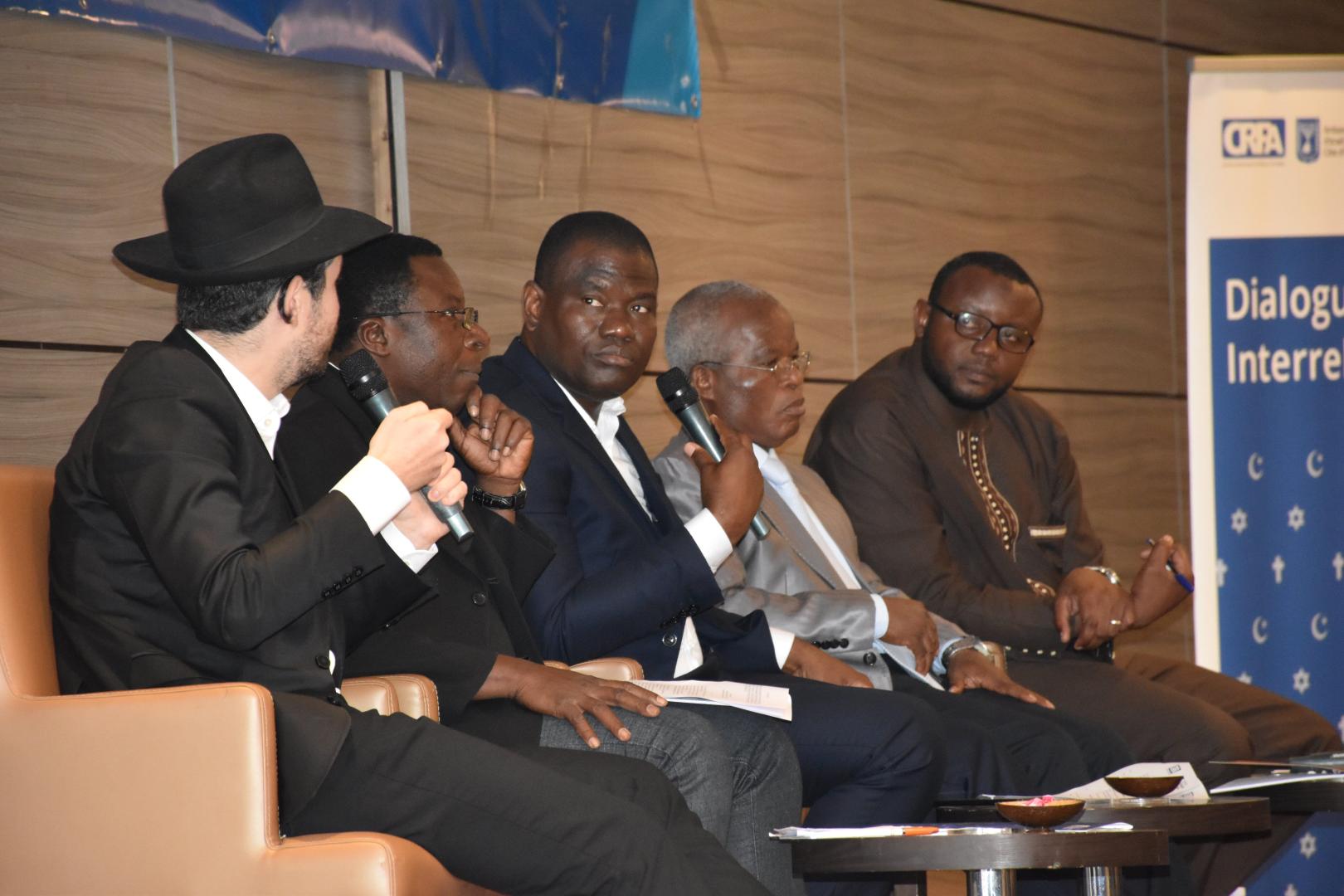Interreligious Dialogue 2020
The conference focused on the role of the clergy in politics and particularly in electoral processes - a major challenge in the face of the multiple regional elections including in Togo, Burkina Faso, Côte d'Ivoire, Guinea and Ghana. At the opening ceremony, the three representatives of the organising institutions stressed the importance of dialogue between religious communities and beyond for peace-building processes in the region. While H.E. the Ambassador of Israel to Côte d'Ivoire, Leo Vinovezky, mentioned the unifying potential of sport - citing the example of the Israeli national team in which the three Abrahamic religions cooperate as a platform for dialogue - Dr. Moquet Flan, President of CRPA, emphasised the religious representatives’ responsibility, stemming from the importance of religion in the daily lives of the people, to further dialogue. Following the remarks by the Director of the Cabinet for Solidarity at the Ministry of Solidarity, Social Cohesion and Fight against Poverty, Mr. Seka, the Resident Representative of the Political Dialogue West Africa at the Konrad-Adenauer-Stiftung in Côte d'Ivoire, Florian Karner, spoke in favour of a strengthened exchange between experts and religious representatives in order to avoid religious conflicts in West Africa which are mostly political in nature.
On the first conference day, there were two panels followed by open exchanges. During the first panel, moderated by Ben Diakité, Editor-in-Chief of the radio station "Radio de la Paix", the expert panellists expressed their views on the role and responsibility of religious representatives in electoral processes. All the panellists entrusted the clergy with the mission to sensitise their communities and to advise political actors on the universal validity of values such as peace and humanism. Father Agui, representing the Cardinal of Abidjan, described the believer as a political being concerned with the affairs of society. As such, he has a role to play in politics. At the same time, Rabbi Zyzek indicated that the Torah invites believers to have open discussions and to encourage democracy. Moreover, he advocated that religious people should use their influence to pacify the political situation.
Following the speech by H.E. the Guinean Ambassador to Côte d'Ivoire who expressed his regret at the chosen direction of the religious leaders in Guinea (the clerics are speaking out in favour of the "Front National pour la Défense de la Constitution” – a civil society association working to ensure adherence to the Constitution), Guinean Imam Sylla Facinet criticised the Guinean government's unwillingness to engage in dialogue with the clergy in order to promote a democratic solution to the political crisis that has been stalling the country’s development since september 2019. While analysing the Guinean context, the panellists also discussed the current pre-electoral environments in other African countries that will hold presidential and local elections this year. All panellists agreed that there were many challenges lying ahead which puts even more emphasis on the role of the clergy to enhance trust among citizens by putting themselves above political positions.
The second day focused on the contribution of religious associations in the process of consolidating democratic achievements and peace. Under the moderation of Ben Diakité, Dr. Christophe Kouamé, President of CIVIS Côte d'Ivoire, shared his contribution on the subject. This was followed by exchanges with the participants who, depending on the socio-political context of their country, stated different points of view in the methodology but agreed on the principles. Abbé Goudjinou as Director of the "Institut des Artisans de Justice et de Paix" (IAJP) in Benin mentioned that religion can serve to humanise societies in which the literacy rate is still low and democracy is in its infancy. Imam Sanni as Vice-President of the Muslim Union of Togo added that clerics should prevent the misreading of religious texts. All the panellists were unanimous on the need for solidarity between religious communities in order to avoid radicalisation and inter-community violence in a tense political environment.
The second part of the day was dedicated to workshops. Different themes were examined by three teams. The first theme was titled "Commitment of religious denominations: foundation and limits". This group discussed the reasons that should motivate the commitment of clergy to political processes but, above all, the limits that should not be crossed according to the imposition of their priesthood.
The second group had the task of reflecting on religious denominations and on the challenges and prospects for the promotion of democracy and peace. On this issue, the participants argued that in addition to preaching the law and faith in God, religious representatives have a duty to work for the preservation and consolidation of peace and democracy. Even if their actions met resistance from political actors, they should work impartially and help bring democracy to their countries.
The third and final working group focused on "Faith-based youth associations in peacebuilding: experiences". In order to carry out the exercise entrusted to them, the young people discussed three questions : What is a religious youth association and what is its role? How do faith-based youth associations participate in peace-building? What are the experiences and perspectives?
The different answers to these questions enabled all participants to be informed about the involvement of religious youth in the process of promoting democracy in their countries and the resource they constitute in the effort to preserve peace through the prevention of inter-community and religious conflicts.
At the end of the conference, the participants all expressed their satisfaction with the quality of the work and the organisation of the third Interreligious Dialogue and expressed the hope that the recommendations would advance political dialogue, the democratic process and the consolidation of peace in West Africa and beyond.
About this series
The Konrad-Adenauer-Stiftung, its educational institutions, centres and foreign offices, offer several thousand events on various subjects each year. We provide up to date and exclusive reports on selected conferences, events and symposia at www.kas.de. In addition to a summary of the contents, you can also find additional material such as pictures, speeches, videos or audio clips.










